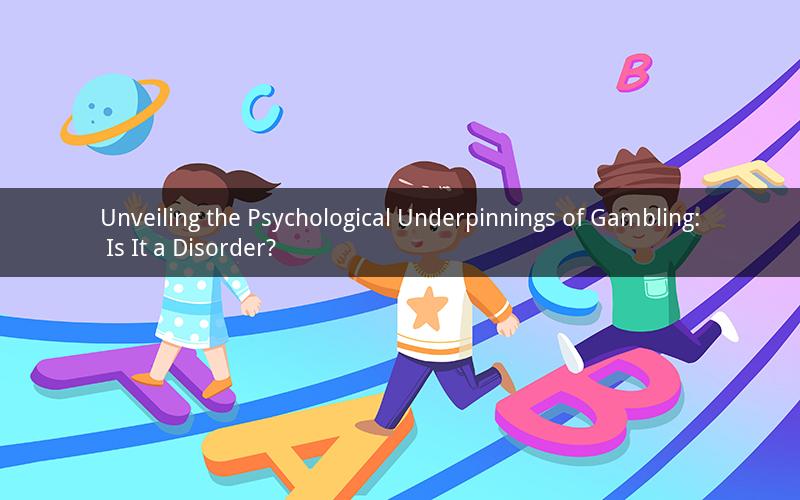
Introduction:
Gambling has long been a topic of debate and controversy. While many view it as a form of entertainment, others argue that it can lead to severe psychological issues. This article delves into the psychological aspects of gambling, exploring whether it can be classified as a psychological disorder.
1. Understanding Gambling:
To comprehend the psychological implications of gambling, it is crucial to understand what gambling entails. Gambling involves betting money or something of value on an event with an uncertain outcome, with the aim of winning more money or material goods. Common forms of gambling include lottery, casino games, sports betting, and online gambling.
2. The Psychological Appeal of Gambling:
Gambling has a unique allure that attracts individuals from all walks of life. Several psychological factors contribute to its appeal:
a. Dopamine Release: Gambling triggers the release of dopamine, a neurotransmitter associated with pleasure and reward. The anticipation of winning creates a sense of excitement and thrill, making gambling an enjoyable experience for many.
b. Risk-Taking Behavior: People who engage in gambling often exhibit risk-taking behavior. The desire for thrill and the possibility of winning big money drive individuals to take chances they might not normally take in their daily lives.
c. Social Aspects: Gambling can be a social activity, providing individuals with an opportunity to interact with others. The social aspect of gambling can enhance the overall experience and make it more enjoyable.
3. The Dark Side of Gambling: Addiction and Psychological Disorders:
While gambling can be a fun and thrilling activity, it can also have detrimental effects on individuals' mental health. Here are some psychological issues associated with gambling:
a. Gambling Addiction: Also known as pathological gambling, this disorder is characterized by an inability to control gambling behavior, leading to significant distress and impairment in various aspects of life. Individuals with gambling addiction may experience intense cravings, mood swings, and a preoccupation with gambling.
b. Anxiety and Depression: Gambling can trigger feelings of anxiety and depression. The fear of losing, the pressure to win, and the emotional rollercoaster associated with gambling can contribute to mental health issues.
c. Impulse Control Disorders: Individuals with impulse control disorders may find it challenging to resist the urge to gamble, even when it has negative consequences. This can lead to financial, social, and psychological problems.
4. Is Gambling a Psychological Disorder?
The classification of gambling as a psychological disorder is a topic of debate among experts. While some argue that it should be classified as a disorder, others believe it is more of a behavioral issue. Here are some arguments for and against classifying gambling as a disorder:
a. Arguments for Classifying Gambling as a Disorder:
- The Diagnostic and Statistical Manual of Mental Disorders (DSM-5) recognizes gambling disorder as a mental health condition.
- Gambling disorder shares several characteristics with other addictive disorders, such as alcohol and drug addiction.
- The negative consequences of gambling addiction can be severe, impacting various aspects of an individual's life.
b. Arguments Against Classifying Gambling as a Disorder:
- Some experts argue that gambling is a form of entertainment and not inherently harmful.
- The line between responsible gambling and problem gambling can be blurred, making it challenging to diagnose gambling disorder accurately.
- The social and cultural aspects of gambling should be considered when assessing its impact on individuals.
5. Conclusion:
The question of whether gambling is a psychological disorder remains a topic of debate. While gambling addiction and its associated psychological issues are well-documented, the classification of gambling as a disorder is not without controversy. Understanding the psychological aspects of gambling can help individuals recognize the signs of problem gambling and seek appropriate help.
Questions and Answers:
1. Q: Can anyone develop a gambling addiction?
A: Yes, anyone can develop a gambling addiction, regardless of age, gender, or background. However, certain individuals may be more susceptible to developing this disorder due to genetic, environmental, and psychological factors.
2. Q: How can I identify if someone has a gambling addiction?
A: Signs of a gambling addiction include a preoccupation with gambling, hiding gambling activities, lying about gambling, neglecting responsibilities, and experiencing negative consequences due to gambling.
3. Q: Is there a cure for gambling addiction?
A: There is no single cure for gambling addiction, but it can be effectively treated. Treatment options include therapy, support groups, and medication, depending on the severity of the addiction.
4. Q: Can gambling disorder be prevented?
A: While there is no guaranteed way to prevent gambling disorder, individuals can take steps to reduce their risk. This includes being aware of the signs of problem gambling, setting limits on gambling activities, and seeking help if needed.
5. Q: Is online gambling more addictive than traditional gambling?
A: Online gambling can be more addictive due to its convenience and accessibility. The ease of access to online gambling platforms and the ability to gamble from anywhere can increase the risk of developing a gambling addiction.